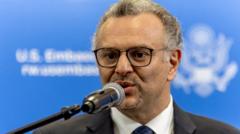**In a time of heightened international scrutiny, President Zelensky's rejection of territorial concessions reveals the deep-seated political and emotional ramifications of the ongoing conflict with Russia, especially concerning Crimea.**
**Zelensky's Stance on Crimea Reflects Ukraine's Political Landscape**

**Zelensky's Stance on Crimea Reflects Ukraine's Political Landscape**
**Ukrainian President's firm opposition to concessions amid renewed peace discussions highlights internal challenges and national sentiment.**
In an atmosphere thick with tension, President Volodymyr Zelensky of Ukraine has taken a clear stand against any American peace proposals that may recognize Russian sovereignty over Crimea, a contentious subject left unresolved since the annexation over a decade ago. At a recent press conference in Kyiv, he emphatically reiterated that any recognition of Russian control would breach Ukraine's Constitution and is thus categorically unacceptable.
This hardline stance is not merely a personal choice but is firmly anchored in the political realities of Ukraine. The notion of conceding Crimea is unpalatable to the Ukrainian populace, who remember the events of 2014 when new divisions were wrought amongst families and communities. “A concession over Crimea would be seen as betrayal,” asserted Kostyantyn Yeliseyev, a former senior aide to Zelensky, illustrating the political repercussions such a decision could entail within the country.
The overwhelming sentiment among Ukrainian lawmakers shows a unified front against any legal endorsement of the ongoing occupation. They view the struggle as a matter of national honor and integrity, knowing any concession on Crimea could result in significant political fallout, akin to political suicide for any parliament member who would dare suggest it.
Meanwhile, across the Atlantic, former President Trump expressed his bewilderment with Zelensky's firmly rooted perspective. In his online remarks, he portrayed Ukraine's stance as prolonging a conflict that could otherwise lead to peace, claiming Crimea had been relinquished long ago. Trump stated, “He can have Peace or, he can fight for another three years before losing the whole Country,” further fueling the ongoing discourse around peace negotiations in light of national sovereignty.
As the discourse continues, Zelensky’s steadfast position serves to reflect not only the complexities of international diplomacy but also the deeply held beliefs guiding the Ukrainian people's quest for unity, recognition, and ultimately, peace.





















